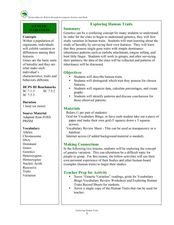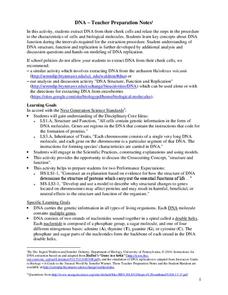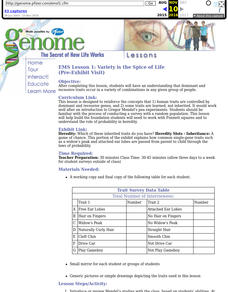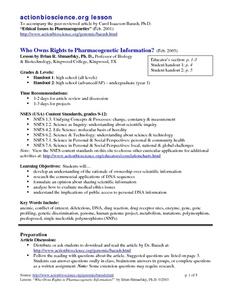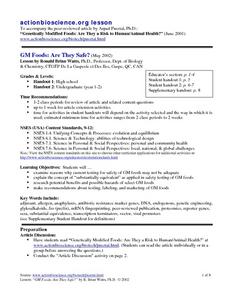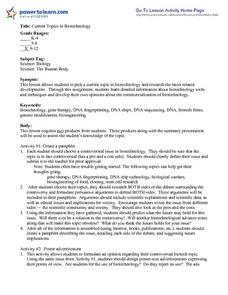Curated OER
Where Are the Dinosaurs?
Students create a dinosaur egg with balloons and newspaper. For this earth science lesson, students explore the extinction of dinosaurs. Students view a web clip and relate it to the extinction of animals they have never seen.
Curated OER
Making Babies
Sixth graders complete a human traits survey. In this genetics lesson students read articles and fill out a worksheet on genotype and phenotypes.
Curated OER
Seabird Survival Adaptation Card Game
Students study seabirds and how they have adapted to their environments. In this activity based instructional activity students will play a card game that will allow them to have a better understanding of seabirds and their...
Curated OER
Biotechnology
In this biology worksheet, learners complete a crossword puzzle with 23 questions on biotechnology. They identify the benefits and ethical issues about biotechnology.
Curated OER
Populations – The Survival of the Fittest (Part 1)
Students explain in their own words why organisms live together. In this biology lesson, students model what happens to organisms if their environment changes. They explain the importance of evolution.
Curated OER
Exploring Human Traits
Learners explore human behavior by participating in a class science game. In this human characteristics lesson, students identify different human traits that are passed down by each generation and the purpose each of them have. Learners...
Curated OER
Sunken Lesson: Animal Growth and Heredity Grade 5
This animal growth PowerPoint includes bulleted text organized into categories including cell division, mitosis, regeneration, sexual and asexual reproduction, life cycles, metamorphosis, and inherited traits. Diagrams are included in...
Curated OER
Biotechnology
Students explore biotechnology through various activities. In this biology instructional activity, students analyze its pros and cons. They study and read informative articles about biotechnology.
Curated OER
BLAST Algorithm
Students explore a series of activities on using BLAST. In this biology lesson plan, students explain the significance of BLAST in DNA query. They give real world applications of BLAST.
Curated OER
Using Blood Tests to Identify Babies and Criminals
Students solve a crime by matching a suspect's blood type to physical evidence collected at the crime scene. In this forensic science lesson, students identify the different blood types. They explain how blood tests work.
Curated OER
Extracting DNA from Your Cells - Teacher Preparation Notes
Students extract their own DNA from cheek cells. In this biology instructional activity, students explain the replication process. They identify the structure and composition of DNA.
Curated OER
Alcohol Tolerance in Drosophila and You
Young scholars develop and run a laboratory comparing alcohol tolerance in flies with and without the ADH enzyme.
Curated OER
Determination of Phylogenetic Relationships Using Restriction Analysis
Students applied various mathematical analyses to interpret their data. By using the resulting DNA fragment patterns from several enzymes students established a possible evolutionary relationship among the mice.
Curated OER
EMS Lesson 1: Variety is the Spice of Life
Students discern that dominant and recessive traits occur in a variety of combinations in any given group of people.
Curated OER
What Can We Learn From the X Chromosome?
Pupils read about the X and Y chromosomes in humans and complete a worksheet.
Curated OER
Who Owns Rights to Pharmacogenetic Information?
Students develop an understanding of the rationale of ownership over scientific information. They research commercial applications of DNA sequences. They analyze how to evaluate medical ethics issues.
Curated OER
GM Foods: Are They Safe?
Students examine the process for testing GM foods. They research benefits and hazards of a selection of GM foods. They also create images of new labels and marketing for GM foods.
Curated OER
Sleep Disorders
Students reach sleep, dreaming and sleep walking. They research these topics at the provide web links as they read through the narrative and questions.
Curated OER
Cancer as a Multistep Process
Students analyze the causes of cancer from a genetic standpoint. They explain the increase in cancer with age and create a hypothesis for cancer development. They use the laws of probability as well.
Curated OER
Genetics: Mice Rule! (Or Not)
Students explore genetics and evolution by examining a hypothetical mouse population. Using coin tosses, they determine mouse traits of parents and offspring. Finally, they consider the outcomes of changing environmental conditions on...
Curated OER
Evolution Simulation
Learners simulate the process of evolution. Using index cards, they copy a drawing. Each subsequent drawing is sent around the room. The results are compared to the original drawing.
Curated OER
Cell Division and Differentiation
Tenth graders investigate about mitosis, meiosis, and cell differentiation and their purposes and implications in the development and functioning of multicellular organisms. Students use individual journals and a variety of hands-on...
Curated OER
Edible DNA
Students use multicolored soft candies (gumdrops and candy orange slices) and toothpicks to create models of DNA structures. They discuss the fact that DNA must copy itself before splitting into two cells. Students demonstrate this by...
Curated OER
Current Topics in Biotechnology
Eleventh graders are introduced to the concept of biotechnology. Using the internet, they research the latest developments in this field and the tools used by biotechnologists. They share their information with the class and create a...
Other popular searches
- Dominant Genes
- Dominant and Recessive Genes
- Recessive Genes
- Genes and Heredity
- Chromosomes and Genes
- Genesis
- Dna, Genes & Chromosomes
- Dominate and Recessive Genes
- Traits and Genes
- Ethnicity Genes
- Color Genes
- Genes Alleles







